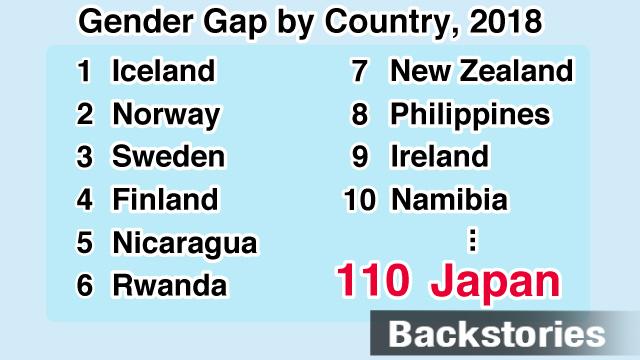2018 gender equality report
Iceland retained the title of the world’s most gender-equal society for the 10th straight year. It was followed by Nordic countries such as Norway and Sweden.
Among the major economies, France ranked 12th, Germany was 14th, Britain was 15th, and the US ranked 51st.
There are 6 countries which ranked 100th or lower among G20 nations. They are China in 103rd place, India in 108th, Japan in 110th, South Korea in 115th, Turkey in 130th, and Saudi Arabia in 141st place.
The 2018 report says the world still has a long way to go in terms of women's leadership in politics and business. Seventeen of 149 countries currently have women as heads of state. On average, only 18% of ministers and 24% of lawmakers are women. As for business, women are in just 34% of managerial positions globally.
Undertakings in Japanese politics
Japan has been trying to tackle the issue. In 2013, Prime Minister Shinzo Abe stated that he would cultivate the power of women to spur economic growth.
Abe’s government holds the World Assembly for Women every year, which invites top female leaders from around the world to exchange views on various topics related to the empowerment of women.
In 2016, a law aimed at enhancing the role of women in the workplace was enacted. It requires the government to come up with policies offering women more opportunities for recruitment and promotion. It also requires the central and local governments and large companies to set numerical targets for female recruits and managers.
In May, lawmakers unanimously approved legislation to increase the number of female legislators, the first of its kind. It requires political parties to balance the number of male and female candidates in an election.
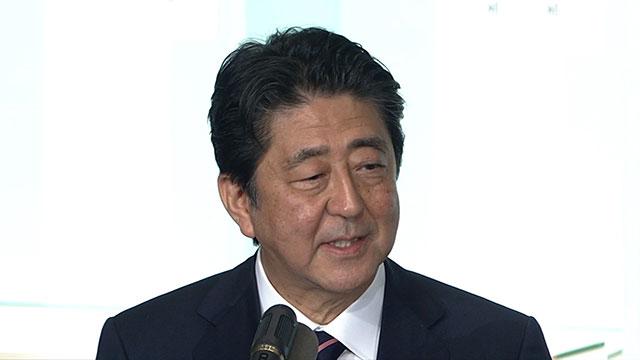
Reality
There are few female ministers in the Japanese Cabinet. The peak was 5 in September 2014. Now, there is only one.
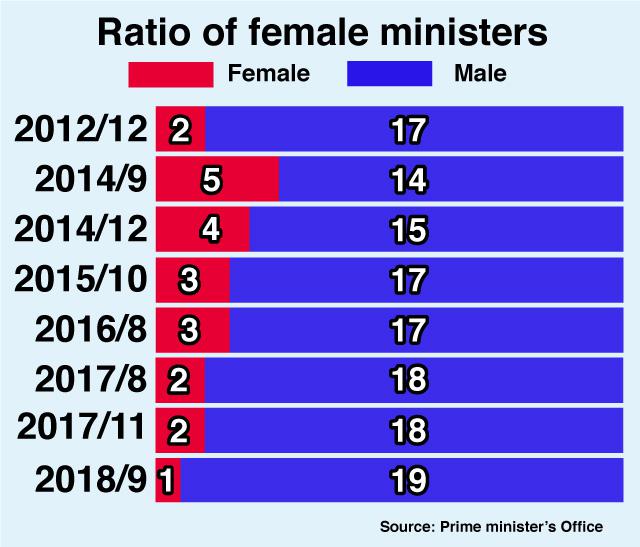
The government has aimed to raise the proportion of female candidates in national elections to 30% by 2020. There have been 4 national elections since Abe returned to power. As for lower house elections, the percentage of female candidates was 16.6% in 2014 and 17.7% in 2017. In the upper house elections, it was 24.2% in 2013 and 24.7% in 2016. Unless political parties put up more female candidates, the number of female politicians will not increase.
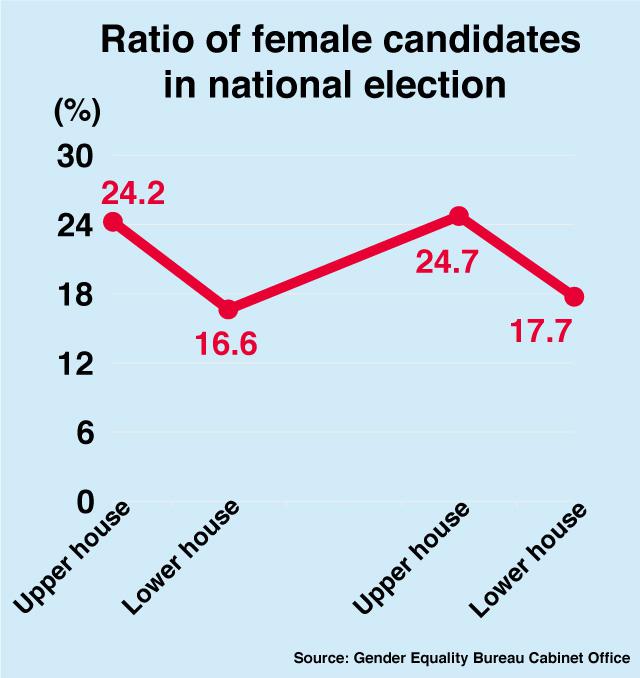
The following graph shows the ratio of female candidates in each party in the 2017 lower house election.
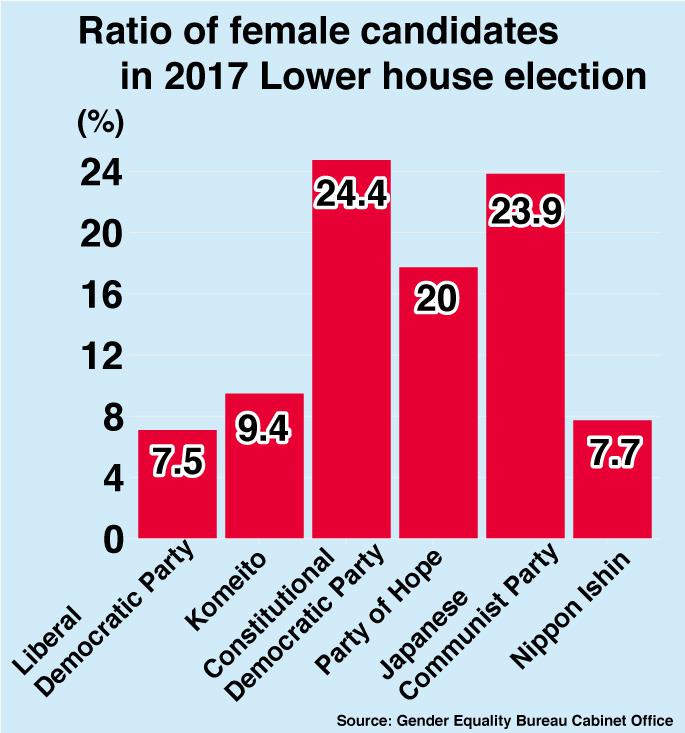
There is only one year left to achieve the numerical targets of female candidates. There will be an upper house election in 2019. One of the points of focus will be the number of female candidates each party puts up.
Women in business
The government has found that the percentage of female executives in Japan's listed companies rose from 1.2% in 2006 to 3.7% in 2017.
According to the Gender Equality Bureau, 43.8% of workers in Japan are female. That's around the same level as other industrialized countries such as Sweden, the US and Germany. But when it comes to women in management positions, the ratio is quite low. For Japan, it's 13%, while it's 39% in Sweden, 43% in the US and 29% in Germany. The government aims to raise the ratio of females in management roles to 25% by 2020.
Tackling the issue
A new NPO, WEConnect International Japan, held its first annual conference in Tokyo on December 5th. The officials explained that there is a tendency for businessmen to distrust female executives or even look down on them. So they say female business owners face hurdles.
The group aims to provide female business owners with new opportunities. For example, it issues certification for companies which purchase goods or services from female-owned businesses. It says this will allow the corporations to show that they value diversity. Similar movements are going on across the world.
Setsu Suzuki, project director of WEConnect International Japan, says that the certification will also help boost companies' profits, and will lead to more jobs for women. She adds that major firms are gradually realizing the importance of female viewpoints in business, so she is calling for them to use women-owned companies in their supply chains.
The Japanese government also gives awards to companies which are actively promoting women into management roles every year.
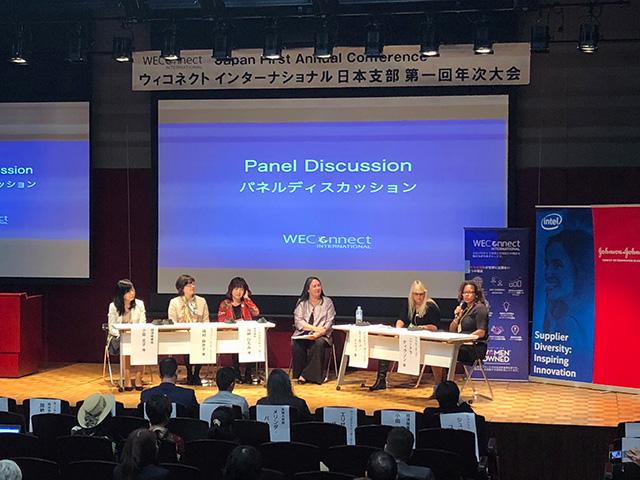
Next year, local elections and an upper house election are scheduled in Japan, and some opposition parties are trying to boost their female candidate ratios to over 30%. It remains to be seen which area will be able to tackle gender inequality faster -- politics or business.
